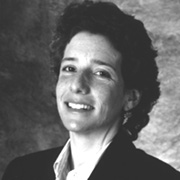
NPR promotes former ATC editor to executive producer
Originally published in Current, Aug. 6, 2001
NPR's Jonathan Kern will succeed Ellen Weiss when she leaves her post as executive producer of All Things Considered, the network announced Aug. 2 [2001].
Kern worked closely with Weiss for five years as ATC's senior editor, after which he served as National Desk interim editor for nine weeks. Most recently, he became NPR's first executive producer for training, conducting in-house seminars for editors and reporters. He joined NPR in 1995 after leaving Voice of America, where he was an editor.
Weiss will assume control of NPR's National Desk next month [story below].
..
|
Kern |
NPR’s Weiss joins news desk in need of leader
Originally published in Current,
July 16, 2001
By Mike Janssen
When NPR's Ellen Weiss ends her 12-year leadership of All Things Considered Sept. 17 and assumes control of its National Desk, she might feel a touch of corporate culture shock.
Though her old and new domains are just a floor apart in NPR's building, more than an elevator ride separates them. ATC's staff on the second floor is united by the daily task of producing a two-hour show, while the network's largest reporting unit, based just upstairs, suffers from indirection and low morale after four years of inconsistent leadership, according to staff journalists.
Blame that difference partly on matters of size and location. About 20 people assemble ATC each weekday in close quarters, while roughly three times as many people contribute to the National Desk from all over the country. The desk's sprawl makes Weiss's new job of senior editor quite a challenge.
Some at NPR say the desk has lacked a strong permanent leader for years. Four editors have led the desk since Larry Abramson ended his eight-year tenure in 1997. Cindy Samuels, the desk's last permanent editor, finished a year-long stint last spring that failed to impress some of her colleagues. (Samuels did not return calls seeking comment.) Interim editors preceded and followed Samuels for long stretches.
The desk's mandate swelled three years ago when it absorbed the sizeable Washington Desk. And the tensions that bedevil any news unit bear even harder on the National Desk, which every day must pull stories from a deep pool of reporters--stringers, station employees and NPR staffers--who have varied experience in journalism.
"It's one of the hardest jobs, if not the hardest job, in the news division, because of the size of the department," says Southern Bureau Chief Michael Fields, who followed Abramson as acting senior editor. "You're the focus point where you have to deal with both shows, you have to deal with your department, and you also sometimes have to deal with the member stations."
"It's a lot to bring in under one desk," says Dale Willman, a former Midwest editor on the National Desk who now is managing editor of the Great Lakes Radio Consortium. "It's a huge responsibility, and, frankly, Cindy [Samuels] wasn't up to it. If anyone can do it, Ellen can."
A bumpy four years
"I don't think there's any doubt that the troops need rallying," says National Desk correspondent Howard Berkes. He and others praise Acting Senior Editor David Sweeney for managing the desk well while NPR sought Samuels' replacement. But temporary editors can do only so much, and Berkes contends that lacking a permanent leader has fostered doubts about the desk's mission.
Most programmers and journalists in public radio know this debate already. Has NPR become too much like CNN and the New York Times? Has it severed its roots in sound-rich reporting in favor of stories that sound like they're read from a newspaper?
"When there isn't a leader in place, anxiety about those things increases," Berkes says.
"How do you balance the interests of doing sophisticated radio that's produced with interest and some flair, and fast competitive reporting that's on the story before you've seen it on the front page of a major newspaper or on network TV?" asks ATC host Robert Siegel. "Ideally, the National Desk should do all of those things. It's just challenging to get the National Desk to do some of those things."
"The demands on the National Desk have been growing, and I don't think the leadership has grown proportionately," says Executive Producer for Training Jonathan Kern, who led the desk for nine weeks after Samuels left. He inherited a mess. Reporters rarely met on even a weekly basis to plan coverage. They told Kern the meetings they did have under Samuels often led to bitter debates over who should cover what.
After Kern led his first meeting, desk staffers came to his office just to shake his hand, he says. "They said, 'That was great!' I said, 'What was great about it?' And they said, 'We haven't been doing this!' It had lacked a strong leader for so long, one reporter said, 'We've begun to doubt our own abilities because there was no one in charge.'"
Pressures on the desk grew even as it floundered. Shows demanded more and more coverage from its reporters. And in 1998 the desk started managing the Washington Desk's 15 reporters, in a merger intended to integrate their coverage and allow more flexibility in assignment.
But the weak leadership has kept news staffers from gauging the success of the Washington Desk merger. "Since I've never known [the desk] to have functioned well since it was done, to this point I can't say it was a great idea," says ATC host Robert Siegel. "I don't think it improved anything."
Weiss supports the merger, but admits to similar doubts. "There's a legitimate concern about the amount of attention we give Washington in comparison to other parts of the country," she says. But the merger occurred "at a time of transition, and we need to figure out if we're making the most of it," she says.
Managing reporters--and dogs
With her time at ATC winding down, Weiss is just starting to craft a strategy for the National Desk.
"It has so much potential, but it's not quite there in terms of where it needs to go," she says, but stops short of elaborating. "In some ways, I can have more influence in making NPR better by being at the National Desk at this point than I can being at All Things Considered. The people on the National Desk deserve to have somebody that they don't have to train in radio."
An NPR veteran, Weiss joined the network in 1982 and, as executive producer of ATC since 1989, has had extensive experience with one side of the show-desk relationship she's about to bridge. She guided ATC's coverage of major news stories, including the conflict in Kosovo, Bill Clinton's impeachment and last year's presidential election.
She also emphasized bringing in more pieces by independent producers, such as David Isay's documentaries and the Kitchen Sisters' Lost and Found Sound series.
NPR Vice President of News Bruce Drake hopes for similar wonders at the National Desk. "The best desks, in addition to providing and supporting the role of primary news provider, are desks that are imaginative in laying down the kind of special series that are important to do and keep listeners with NPR," he says.
Drake wants the National Desk to supply "a couple more substantive news stories per cycle, either breaking news or something that becomes news because we make it news."
Weiss was first approached about taking the National Desk job last year, but she wanted to stay at ATC and see it through its 30th anniversary. Earlier this year she was approached again, and surprised herself when she began taking the idea more seriously.
"It suddenly became more and more clear to me that the potential to make a difference could be great," she says. "I expected my next job to be a little further out of the belly of the beast, not right in the center of it. But I have to say that it now feels exactly right."
Weiss's colleagues agree. They note her extensive experience with NPR's complex internal politics and praise her energy and managerial skills. Kern, who edited ATC for five years, says Weiss has the rare ability to criticize her staffers' work without making it sting.
"I've told people that I never knew there was a gift for management until I met Ellen Weiss," he says. "I knew there were gifts for math. I knew there were gifts for chess. But not management."
It's a good thing, too, since the National Desk editor must grasp the big picture and pay attention to picky details. When Siegel was news director, he was forced to stave off threats of eviction from NPR's California bureau when a reporter repeatedly took his dog into the building. (Why would someone bring a dog to work? he still wonders.)
Managing reporters "is a complicated life," he says, and when there's not strong leadership at a news organization "people get accustomed to not being very closely managed. I imagine Ellen Weiss will have to turn up and announce that she's the law."
|
Weiss |
 |
To Current's home page |
| Earlier news: ATC celebrates its 30th anniversary earlier in the year. |
Web page posted Dec.
11, 2002
Current
The newspaper about public television and radio
in the United States
A service of Current Publishing Committee, Takoma Park, Md.
E-mail: web![]() current.org
current.org
301-270-7240
301-270-7240
Copyright 2002

